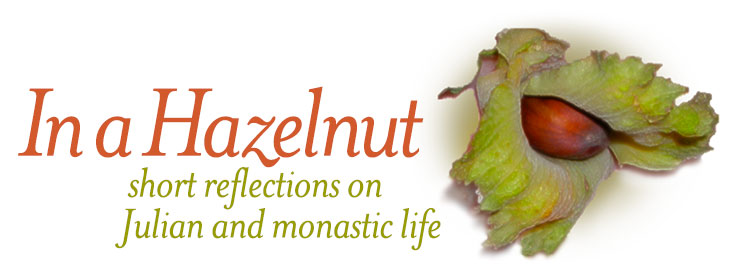Rejoicing in our salvation
The thing I love most about Julian is her wonderfully prosaic (could I say “poetically” prosaic?) sensibility: Here is the passage of Julian near the end of the book to which I keep coming back:
“He loves us endlessly, and we sin habitually, and he shows the sin to us most gently; and then we sorrow and mourn prudently, turning ourselves to the contemplation of his mercy, cleaving to his love and goodness, seeing that he is our own medicine, aware that we do nothing but sin. I marveled greatly at this vision, for notwithstanding our stupid living and our blindness here, yet endlessly our gracious Lord looks upon us in this struggle rejoicing. And of all things we can please him best by wisely and truly believing that, and rejoicing with him and in him.” (Ch 85)
This endless loving of us, this endless rejoicing in us is not in any way sentimental, but a perception that is intent. As the preacher George MacDonald wrote, “Where loveliness is incomplete, and love cannot have its fill of loving, it spends itself to make more lovely, that it may love more...all that is not beautiful in the beloved, all that comes between and is not of love's kind, must be destroyed.” This corresponds to the truthful edge in Julian, one of the two poles that hold the fine tension that Julian is able to maintain, but that is sometimes lopped off in favor of the promise of Jesus that all shall be well. But if the integrity of that tension is compromised, the revelation to Julian cannot do its prophetic work.
As with the woman at the well, Jesus will bring us to all loveliness not by loathing our sin, or simplistically discounting it, but by showing us truth, loving us deeply and completely in that showing, and inviting us to agree. In this process of medicinal truth-telling and perception, it is important that we do as Julian counsels us, turning ourselves to the contemplation of Jesus’s mercy, cleaving to his love and goodness, and yielding ourselves to the touchings of the Holy Spirit who seeks to heal us.
The temptation is to turn ourselves instead to the contemplation of our sins, and to the sense of our own stupidity and blindness, which is often more real to us than anything Jesus may seem to have on offer. By living our life here simply, gratefully, perceptively; looking at Jesus and not at ourselves, rejoicing in the life and in each other as Jesus does, it is in this way we can honor Julian best. Thanks be to God for this gift of our life, who in giving us himself gives us all.
Recent Issues
January 2025
September 2024
May 2024
March 2024
February 2024
January 2024
December 2023
November 2023
October 2023
July 2023
May 2023
January 2023
December 2022
October 2022
September 2022
July 2022
May 2022
April 2022
March 2022
January 2022
December 2021
November 2021
October 2021
June 2021
May 2021
April 2021
February 2021
January 2021
December 2020
October 2020
September 2020
August 2020
July 2020
June 2020
May 2020
April 2020
March 2020
February 2020
January 2020
December 2019
November 2019
October 2019
September 2019
August 2019
July 2019
May 2019
April 2019
March 2019
January 2019
December 2018
November 2018
October 2018
September 2018
August 2018
July 2018
June 2018
May 2018
April 2018
March 2018
February 2018
January 2018
December 2017
November 2017
October 2017
September 2017
June 2017
May 2017
April 2017
March 2017
February 2017
January 2017
December 2016
November 2016
October 2016
September 2016
August 2016
July 2016
June 2016
May 2016
April 2016
March 2016
February 2016
January 2016
December 2015
November 2015
October 2015
September 2015
August 2015
July 2015
June 2015
May 2015

